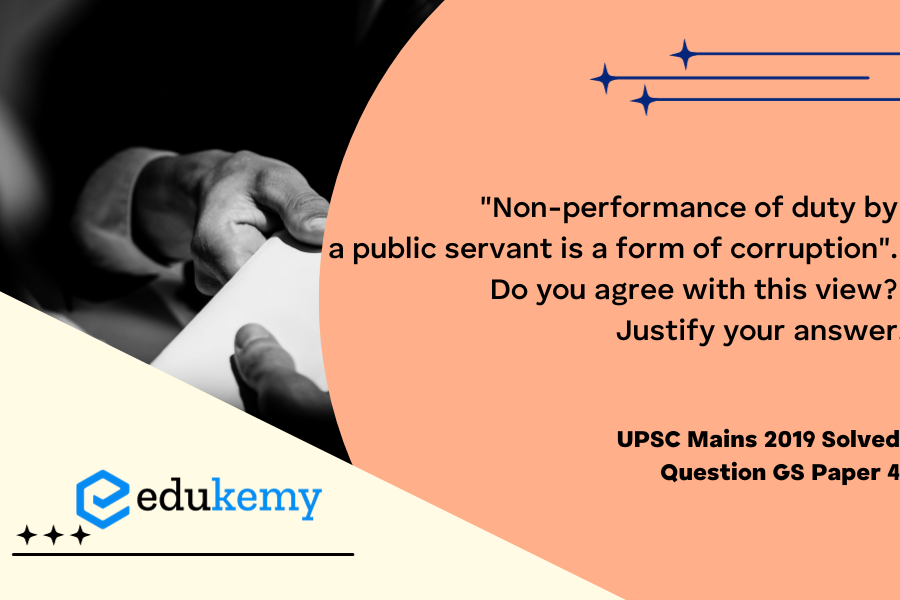The assertion that non-performance of duty by a public servant constitutes a form of corruption encapsulates a nuanced perspective on ethical governance. Corruption traditionally conjures images of financial malfeasance, but the failure to fulfill one’s responsibilities can be equally corrosive to the principles of public service. When entrusted with the well-being of the community, public servants assume a sacred duty to execute their roles diligently. A failure to deliver on these obligations undermines the public’s faith in the system, erodes transparency, and hampers societal progress. Inaction, negligence, or intentional avoidance of responsibilities can manifest as a subtle yet insidious form of corruption, perpetuating inefficiency and fostering a culture of impunity. Ultimately, a comprehensive understanding of corruption must encompass not only monetary transgressions but also the ethical imperative to actively engage in and discharge one’s designated duties for the greater public good. In essence, the non-performance of duty by a public servant can indeed be construed as a manifestation of corruption, casting a shadow on the integrity of public institutions.
Contents
Decoding the Question:
- In the Introduction, elaborate on the definition of corruption.
- In Body,
- Write a few points in favor of this view (also give some examples).
- Write a few points against the view.
- Conclude, with an opinion.
Answer:
Transparency International regards corruption as an abuse of power that erodes the fabric of society. It undermines people’s trust in the political system, its institutions, and its leadership. A distrustful or apathetic public can then become yet another hurdle to challenging corruption. Non-performance of one’s duty is regarded as next to corruption depending upon the situation and intent. But one cannot discern just the non-performance of duty as corruption without analyzing its causes.

Non-performance of duty as a form of corruption:
- Acting Against the Order: A public servant is expected to follow the rules and regulations. It is necessary to do as per the instructions to keep the credibility of the institution intact. Failing to follow instructions can be compared to corrupt practice. For example, a public servant, when ordered to evict illegal construction and failing to do so, will create a common perception that the official has taken a bribe to avoid eviction.
- Misleading Public: Not doing duty is like hiding information from the public domain. Such nonperformance creates a sense of misleading acts that are equal to corruption. For example, a public servant fails to clear the pension of a citizen leading to failure to perform his duty.
- Unprofessional: Professionalism is one of the major features of a public official and one needs to maintain it at all levels. Failing to keep up with work expectations may be considered to be a corrupt practice. For example, a police officer avoids reaching the site of the crime.
- Violating Basic Rights: All civil servants are entrusted with public duty for the welfare of the masses. Negligence to public duty costs the masses the loss of their freedom, health, education, rights, and even life. Hence, non-performance of duty by a public official is also a form of corruption. For example, a doctor willfully failing to hospital on time threatens the life of the patients, or a teacher avoiding his duty not only endangers the future of children but of society as a whole.
- Resource Wastage: All public servants must ensure that the public money is spent most efficiently and that programs are provided effectively, without discrimination or prejudice, with transparency, and waste of money or resources.
Non-performance of duty is not always considered a form of corruption:
- Technical Issues: Unintentional situations may arise that may prevent an official from performing his or her duty. This does not mean that a public servant is practicing corruption. For example, connectivity problems may prevent an official from doing his/her duty.
- Inner-consciousness: Sometimes the duty a public official is expected to perform may not be ethically right. In such cases, the official may decide against doing his duty. For example, public servants may refuse to follow some orders as it may harm community interests.
- Other Issues: Non-performance of duty by a public servant may be due to lack of coordination, lack of human power, and budget.
Corruption amounts to a breach of faith reposed by the public in civil servants and a violation of the rights of individuals. It presents a roadblock to effective administration, law and order, failure to achieve the objectives of welfare policies, and eventually guarantee of realization of constitutional goals like social, economic, and political justice.
Non-performance of duty by public servants for which they are morally, legally, and constitutionally mandated to do, is a form of corruption as the Prevention to the Corruption Act considers non-performance of public duty as an offense
A civil servant should use his office that derive rightfulness from the public and utilize public resources to serve public interests only. Whenever public servants act in ways that violate set standards for public servants, they violate the natural order of things that hold them all together. That deviation from duty itself is what is enough to make one corrupt and not what fruits or pains that deviations bring to one. However, in all cases not performing duty does not always translate to corruption. Hence, every public servant needs to perform their duty as mandated to uphold the constitutional values and become a vehicle for change in the life of the masses.
In case you still have your doubts, contact us on 9811333901.
For UPSC Prelims Resources, Click here
For Daily Updates and Study Material:
Join our Telegram Channel – Edukemy for IAS
- 1. Learn through Videos – here
- 2. Be Exam Ready by Practicing Daily MCQs – here
- 3. Daily Newsletter – Get all your Current Affairs Covered – here
- 4. Mains Answer Writing Practice – here


